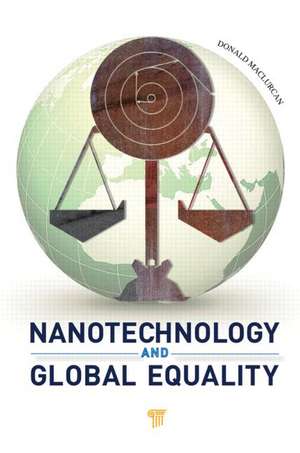Nanotechnology and Global Equality
Autor Donald Maclurcanen Limba Engleză Hardback – 27 mar 2012
Preț: 457.21 lei
Preț vechi: 586.31 lei
-22% Nou
Puncte Express: 686
Preț estimativ în valută:
87.50€ • 91.01$ • 72.23£
87.50€ • 91.01$ • 72.23£
Comandă specială
Livrare economică 24 martie-07 aprilie
Doresc să fiu notificat când acest titlu va fi disponibil:
Se trimite...
Preluare comenzi: 021 569.72.76
Specificații
ISBN-13: 9789814303392
ISBN-10: 9814303399
Pagini: 300
Ilustrații: 14 b/w images
Dimensiuni: 152 x 229 x 30 mm
Greutate: 0.79 kg
Ediția:1
Editura: Jenny Stanford Publishing
Colecția Jenny Stanford Publishing
ISBN-10: 9814303399
Pagini: 300
Ilustrații: 14 b/w images
Dimensiuni: 152 x 229 x 30 mm
Greutate: 0.79 kg
Ediția:1
Editura: Jenny Stanford Publishing
Colecția Jenny Stanford Publishing
Public țintă
Academic and PostgraduateCuprins
Introduction. Methodology. Development, Technology and Inequity. Nanotechnology, Development and Inequity. The State of Play. Understanding Nanotechnology. Innovative Capacity. Technological Appropriateness. Approaches to Technological Governance. Conclusions. Appendices.
Recenzii
"Donald Maclurcan has drawn on the skills and knowledge of a range of disciplines to consider the complex question of the impacts of nanotechnology. He has assembled an impressive body of evidence to show that nanotechnology as presently developed offers little hope for a more equitable world. This is a very significant conclusion, as we are often urged to believe that new technology can help the development aspirations of poor countries. The subject is important, the writing is clear and the case is compelling."
—Prof. Ian Lowe - President, Australian Conservation Foundation
"Donald Maclurcan’s book provides a timely discussion about the implications of the emergence of nanotechnology for the global South, in a context in which technological innovation and global social inequality have been increasing hand in hand. Maclurcan addresses the topic in a well-balanced and evidence-supported way, exploring theories, discourses, quantitative data, and scientists’ and other stakeholders’ perspectives to assess if and how nanotechnology can contribute to a more equitable world. Written in direct and simple language, this book is relevant not only for academia but also for civil society groups and the broader public."
—Prof. Noela Invernizzi - Federal University of Paraná, Brazil
"Nanotechnology and its impact remain a black box. Although our understanding of the social, economic, environmental, public health and ethical outcomes associated with the expanding nano-industries is growing, gaps in our understanding remain. In this book, Dr Maclurcan makes a significant contribution towards filling the void in the contemporary understanding of the social justice dimensions related to research, development and commercialisation of nanotechnology, especially for the global South. Through the presentation of rich and detailed empirical data, and grounded in theories of development and technological change, Maclurcan provides valuable insights into the relationships between new technologies and hopes for a more equitable world."
—Prof. Kristen Lyons - Griffith University, Australia
—Prof. Ian Lowe - President, Australian Conservation Foundation
"Donald Maclurcan’s book provides a timely discussion about the implications of the emergence of nanotechnology for the global South, in a context in which technological innovation and global social inequality have been increasing hand in hand. Maclurcan addresses the topic in a well-balanced and evidence-supported way, exploring theories, discourses, quantitative data, and scientists’ and other stakeholders’ perspectives to assess if and how nanotechnology can contribute to a more equitable world. Written in direct and simple language, this book is relevant not only for academia but also for civil society groups and the broader public."
—Prof. Noela Invernizzi - Federal University of Paraná, Brazil
"Nanotechnology and its impact remain a black box. Although our understanding of the social, economic, environmental, public health and ethical outcomes associated with the expanding nano-industries is growing, gaps in our understanding remain. In this book, Dr Maclurcan makes a significant contribution towards filling the void in the contemporary understanding of the social justice dimensions related to research, development and commercialisation of nanotechnology, especially for the global South. Through the presentation of rich and detailed empirical data, and grounded in theories of development and technological change, Maclurcan provides valuable insights into the relationships between new technologies and hopes for a more equitable world."
—Prof. Kristen Lyons - Griffith University, Australia
Descriere
The book places nanotechnology’s emergence within a broad historical and contemporary global context while developing and testing an interpretive framework through which to assess nanotechnology’s claims. It clarifies the nature of global engagement with nanotechnology research and development, revealing surprising scenarios, unacknowledged by most mainstream commentators. The book concludes by exploring a range of perspectives from Thailand and Australia about nanotechnology’s foreseen implications for global inequity.
